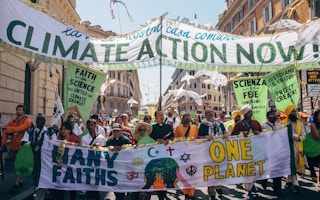Eco-Business has raised an important question in asking how the climate crisis can cut through the Covid-19 media storm last week. But this question can be resolved by realising that the two issues share the same cause—our current economic and financial models.
Our current economic model is the root cause of the climate crisis as it values today’s gains and ignores their future costs.
Edwin Yeo of SPRG Singapore stated in Eco-Business’s piece that “climate change has always been couched as tomorrow’s problem, and people don’t worry about tomorrow when there is a clear and present threat today.”
But what is here today is visible and hardly debated, and what is to come is challenged by many. Some dismiss climate change as a hoax, until they inevitably face its negative effects.
The current economic model is based on the concepts of profit optimisation and shareholder value, which pay little to no attention to externalities.
Covid-19 presents a clear example of the dangers of profit optimisation. In an attempt to get rich quickly, some people in China compromised on the methods of breeding and trading in wildlife. The cheaper and subpar production, processing and distribution led to the spread of infectious diseases.
Maintaining modern standards for managing wildlife proved too costly. Fighting swine and bird flu is a never-ending challenge in Europe, and farmers there complain about the added costs and hassle that come with prevention measures. But still it is cheaper than dealing with an outbreak.
In 2003, the already globalised world experienced SARS, although it happened at a slower pace and was more easily contained than the current Covid-19 pandemic. Since then, the quest for more and cheaper production has created a wide distribution network of goods and people, allowing the coronavirus to travel quickly.
Climate change has the same root cause. We produce and consume as much as we can to meet our excessive lifestyle demands—the more the better, as long as the burden of negative externalities do not fall on us.
While not perfect, implementing a carbon tax is a good start to bringing forward the externality of climate change. But corporations are fighting against a carbon tax, like they do with all kinds of taxes. The higher the profit margin, the higher their annual bonuses.
To fight climate change, Covid-19, and anything else on its way, we need to build a new economy—one that accounts for all the externalities involved.
This new economy prioritises solar and wind power so that energy is something that all nations and people from all walks of life have access to. Moving away from oil creates more equality as the fossil fuel is a commodity that is controlled by few.
The new economy also focuses on decentralising production. Centralised production with worldwide distribution makes other economies dependent on the producers and adds unnecessary logistics. The distribution channels—ships, planes, trucks—carry with them an army of pathogens.
We need new methods of production, technologies and above all, more modest demands from consumers. why not read a book on your terrace instead of cruising with 5,000 other people to invade the terraces of Venice?
More optimistically, we already have all the bricks, bolts, nuts and tools to build a new economy and society. All the Lego pieces are in front of us to achieve a better and more just world, climate and society.
This new world might not be as glamourous nor abundant as some of us would like. But we will have more than enough to live a “good life”.
Climate change and infectious diseases do not have to fight against each other for media attention, because they need the same cure.
To continue reading, subscribe to Eco‑Business.
There's something for everyone. We offer a range of subscription plans.
- Access our stories and receive our Insights Weekly newsletter with the free EB Member plan.
- Unlock unlimited access to our content and archive with EB Circle.
- Publish your content with EB Premium.











